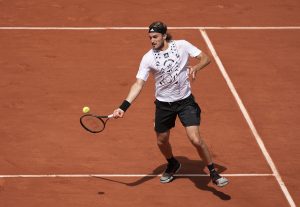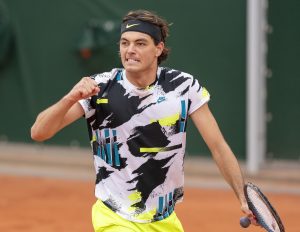Is there anything human beings enjoy more than apportioning blame? It is a phenomenon doubtless amplified by the advent of social media, but one rather suspects that it is as old as society itself. But it is also reductive. The ‘blame game’ has little to no interest in contrition, let alone taking a measured view. Instead, the goal is to find a culprit and then saddle them with responsibility and then criticise them relentlessly until the next target appears. In the tennis world, there is no better target for the blame game than Novak Djokovic.
The Serbian has always occupied an awkward position in the sport. Arriving late to the party in this golden era of men’s tennis, most of the fans who view tennis as a tribal sport had already settled on either Roger Federer or Rafael Nadal. That left Djokovic with the role of villain, a role made an even more natural fit to the western-centric sport by his eastern European heritage.
But it is not a part Djokovic has ever looked comfortable playing. In temperament, the Serbian is markedly different from former-ice men such as Ivan Lendl. Djokovic may well excel at playing against a hostile crowd and possess a remarkable focus even when under mountainous pressure. But he also wears his heart on his sleeve, more so than his great rivals Federer and Nadal, and clearly wants to be liked, a fact Nick Kyrgios rather cruelly used to taunt him last year.
Unfortunately for Djokovic, he has also shown a concerning naiveté at times in his career. He is a firm believer in the power of visualisation and positivity, which has led him to associate with various ‘gurus’, whose credentials are, at best, shaky. Usually those beliefs are harmless, if exposing him to the mockery of those who consider themselves better informed. But in the midst of a global pandemic, they have led Djokovic badly astray.
He has expressed a reluctance to be vaccinated in order to travel and given Chervin Jafarieh, a nutritionist whose claims about the power of positive-thinking and emotions stretch credibility to say the least, a platform to share his ‘expertise’. Jafarieh charges $50 for a bottle of ‘Golden Mind’, an elixir that can supposedly ‘stimulate growth of new brain cells’ and ‘enhance memory and learning abilities’. That is, in short, nonsense and Djokovic does not help himself or others by publicising it.
But those were small missteps compared with the Adria Tour, the exhibition event assembled by Djokovic. Not only was the Adria Tour played in front of a crowd and without any social distancing, the players involved socialised off-court, playing basketball and football, as well as going clubbing. Indeed, watching the proceedings, few could have guessed that the world remained firmly in the grip of the most serious pandemic in living memory.
That blew up in Djokovic’s face dramatically when Grigor Dimitrov, who played in both the Serbian and Croatian legs of the tour, revealed he had tested positive for coronavirus. Borna Coric, Viktor Troicki and Djokovic have all since tested positive for the virus, as have Troicki and Djokovic’s wives, Dimitrov’s coach and Djokovic’s fitness coach. Unsurprisingly, Djokovic has been on the receiving end of a storm of criticism since.
Djokovic certainly deserves censure. There is no escaping the reality that his actions were irresponsible and potentially dangerous. At the very least, players should have undergone rigorous testing before and during the event, particularly because Dimitrov had arrived from Florida, with the USA still firmly in the grip of the pandemic. It is also hard to defend the decision to socialise and so flagrantly ignore social distancing, which has been proven to limit the spread of the disease.
But the glee with which Djokovic is criticised is troubling. In far too many cases, whether it be fans on social media or, worse still, journalists, Djokovic’s error in judgement is being treated as the perfect opportunity to unleash what appears to be years of pent up scorn for the Serbian. The Adria Tour was not Djokovic’s mistake alone, but there has been little if any criticism for the other players involved, none of whom showed any more regard for social distancing than the world #1.
Which begs the question: why the unremitting focus on Djokovic? It is partly, and justifiably, because he organised the event and therefore bares the greater share of the responsibility. But it is also surely because he is the most high profile target. It is the name Djokovic, more than Dimitrov or Coric, that will draw clicks and retweets. Why does this matter? Because it smacks of criticism for the sake of criticism, the chief purpose being to gratify the critics.
One result is that Djokovic’s diehard fans have leapt to his defence, either downplaying the risks posed by the coronavirus, excusing him of any responsibility or, in the most extreme cases, flat out denying the existence of the virus. As in far too many areas of life, partisanship and polarisation reign supreme. We are all either a hero or a villain. That Djokovic is only a tennis player, one who made an honest, if serious mistake, has no place in the conversation.
It is all reductive. Djokovic surely knows he erred and nothing about the man suggests his remorse is not genuine. But as long as the mistake is considered more important than the apology, nothing of any real value will be learned on either side. Nor is it is sustainable. The divisions will remain, but their prominence will recede and the whole debacle will likely be all but forgotten, displaced by the next cycle of outrage.
This is not a defence of Djokovic. It is a request for a degree of moderation and consideration, for an end to delighting in the mistakes of others. Schadenfreude may enjoyable in the short term, but it is not an attractive quality. Nor is cynicism. Unfortunately, the blame game thrives on both. And as long as we continue to play it, we will all continue to lose.
Main photo:
Embed from Getty Images






